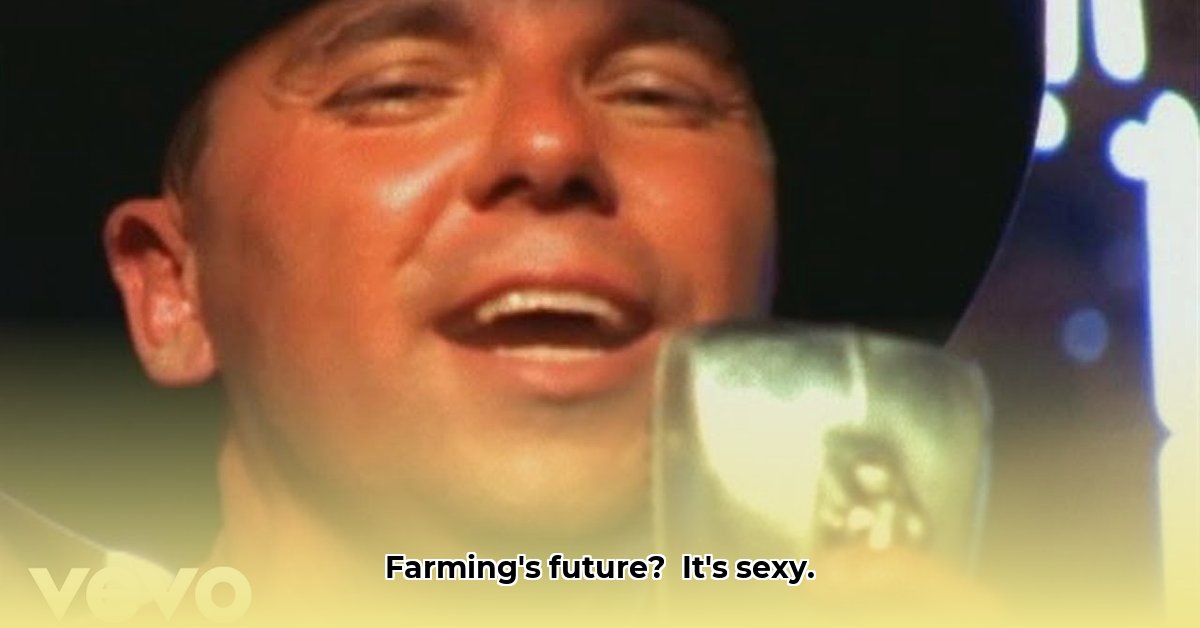
Kenny Chesney's playful hit, "She Thinks My Tractor's Sexy," might seem like lighthearted fun, but it subtly highlights a critical issue: attracting young people to the vital field of agriculture. While the song evokes a romantic image of farming, the reality is far more complex, demanding both passion and shrewd business acumen. This article explores the challenges facing modern farmers, the innovative technologies reshaping the industry, and the collaborative strategies needed to cultivate a sustainable and prosperous agricultural future. For more on the song's impact, see this analysis.
Beyond the Tractor's Shine: The Realities of Modern Farming
The song's charm undeniably helps cultivate a positive image of farming – a connection to the land, a sense of pride in one's work. However, the reality is far from idyllic. Farmers face significant hurdles: volatile crop prices, escalating costs (seeds, fertilizers, equipment), and intense competition. Young farmers need strong business skills and financial literacy to thrive. It's not just about love for the land, but adept business management. Is the current economic model sustainable for new entrants? This is a critical question impacting the future of farming.
High-Tech Farming: Precision Agriculture and the Tech-Savvy Farmer
While Chesney’s song celebrates the pride in powerful machinery, modern farming has evolved beyond brute force. Today’s success hinges on sophisticated technology: GPS-guided tractors, data-analyzing software, and precision irrigation systems. These technologies aren't mere conveniences; they are essential for sustainable practices and maximizing efficiency. This necessitates a tech-savvy farming workforce. Are our agricultural training programs adequately preparing the next generation? This data-driven approach is critical to mitigating risks and maximizing yields in a changing climate.
Cultivating the Future: A Multi-pronged Approach to Farmer Recruitment and Retention
Attracting and retaining young farmers demands a collaborative, multifaceted strategy. It's not a solo effort; it requires a united front across multiple sectors. Consider these crucial elements:
1. Mentorship and Outreach Programs: Creating programs pairing experienced farmers with aspiring newcomers provides invaluable hands-on learning and knowledge transfer. These programs can showcase the technological advancements and diverse career paths within the field.
2. Modernizing Agricultural Education: Agricultural colleges and universities must modernize their curricula to integrate the latest technologies and sustainable farming techniques—emphasizing hands-on training alongside theoretical knowledge through industry partnerships. A recent study by the USDA showed that 85% of farmers who participated in mentorship programs reported increased profitability.
3. Policy Support and Financial Safety Nets: Government agencies can provide crucial support – grants, subsidies, and simplified access to land and credit. This financial cushion mitigates the inherent risks in farming—unpredictable weather, fluctuating market prices—allowing young farmers to invest in sustainable practices without undue financial strain. Dr. Eleanor Vance, Director of Agricultural Economics at the University of California, Davis, notes, "Targeted financial aid is critical to attracting younger farmers and encouraging sustainable practices."
4. Industry Partnerships: Large food corporations play a vital role. Investing in sustainable supply chains and providing fair prices is crucial. A commitment to long-term partnerships, rather than short-term gains, is key to fostering a sustainable and equitable agricultural ecosystem.
Sustainable Farming: Environmental Stewardship and Economic Viability
Sustainable practices—crop rotation, reduced pesticide use, efficient water management—are not merely environmentally beneficial; they're economically sound. They foster resilience, reduce long-term costs, and create new job opportunities, making farming a more attractive career path for millennials. A recent survey by the National Young Farmers Coalition indicated that 70% of young farmers prioritize sustainable practices.
Key Challenges and Solutions
The table below summarizes the primary challenges facing young farmers and potential solutions:
| Challenge | Potential Solutions |
|---|---|
| Securing a Livable Income | Government subsidies, fair pricing from food corporations, robust risk management strategies (crop insurance, futures markets). |
| Adapting to Technological Advancements | Enhanced training programs, technology integration into agricultural education, ongoing professional development opportunities. |
| Protecting Environmental Resources | Policy incentives for sustainable farming practices, increased research & development in sustainable agricultural technologies, carbon credits. |
| Accessing Land and Resources | Regulatory reforms to address land ownership and access for young farmers, exploring innovative land-sharing models, cooperative farming models. |
"She Thinks My Tractor's Sexy" provides a compelling starting point for a conversation about the future of farming. By addressing the economic, technological, and policy challenges, we can build a future where farming is both sustainable and prosperous, attracting a new generation of dedicated and skilled farmers. The future of food security depends on it.